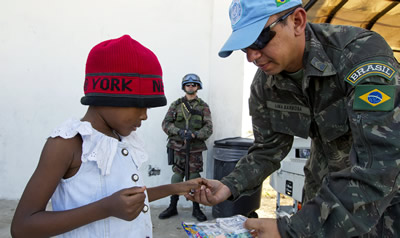International Day of United Nations Peacekeepers
"United Nations peacekeeping is increasingly called on to deploy multi-dimensional operations to help countries transition from conflict to peace", says the UN Secretary-General, Ban Ki-moon.

This year's International Day of Peacekeepers is an opportunity to raise awareness about new developments in the field while honouring those who lost their lives over the past year serving under the blue flag.
United Nations peacekeeping is increasingly called on to deploy multi-dimensional operations to help countries transition from conflict to peace, with a significant focus on protecting civilians, including the most vulnerable among them: women and children.
To meet emerging threats and rise to new challenges, United Nations peacekeeping is adapting its policies to better fulfil its mandates to bring lasting peace to war-torn countries.
We see one example of a new approach in the Democratic Republic of the Congo (DRC), where the Security Council has authorized the deployment of an "Intervention Brigade" as well as unarmed, unmanned aerial vehicles to improve our ability to operate in this vast region.
Peacekeepers in Mali will operate under tough conditions marked by armed groups that threaten national and regional security. The mission will help stabilize the country, foster national reconciliation and protect civilians.
UN peacekeeping is also working to help reform national rule of law institutions. By strengthening the police, courts, and corrections, UN peacekeeping forges trust in local authorities. A fair and predictable rule of law system contributes, in turn, to stability and sustainable development long after our troops leave.
While we welcome these advances, we acknowledge that peacekeeping will always carry risks. Unidentified assailants have recently ambushed and killed peacekeepers in the DRC, Sudan and South Sudan, while blue helmets serving in the Middle East have been detained.
One hundred and eleven peacekeeping personnel died last year, and more than 3,100 have lost their lives during the UN's 65-year history of peacekeeping. We salute their bravery and mourn their passing.
On this International Day, let us pay solemn tribute to those who have fallen, support the more than 111,000 serving soldiers and police from 116 countries, and continue adapting our operations to better help civilians who need protection and support.
Ban Ki-moon
Secretary-General
United Nations